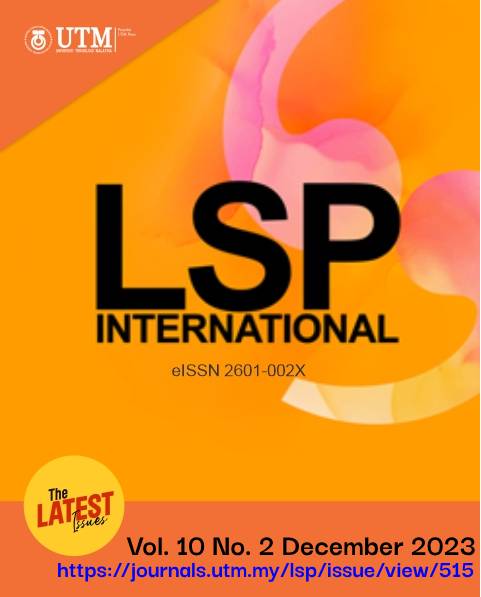The Use of Lexical Approach in Enhancing Vocabulary Skills among Upper Primary Learners
DOI:
https://doi.org/10.11113/lspi.v10.21480Keywords:
Lexical approach, vocabulary skills, upper primary, learners, ESLAbstract
This study explored the impact of a lexical approach on enhancing the vocabulary skills of upper primary pupils in an ESL classroom in Malaysia. The research involved 30 elementary school pupils in Johor and used a mixed-method research design. Data collection methods included pre and post-tests, an observational checklist, and a focus group interview. The results indicated a significant improvement in the students' vocabulary skills after implementing the lexical approach. Additionally, this approach positively affected students' motivation and changed their negative perceptions about vocabulary. The paper concludes with recommendations and implications for educators and researchers, considering its limitations.
References
Adamson. (1992). Academic competence: Theory and classroom practice: Preparing ESL students for content courses. Longman.
Al-Khasawneh, F. (2019). The impact of vocabulary knowledge on the reading comprehension of Saudi EFL Learners. Journal of Language & Education, 24-34.
Alqahtani, M. (2015). The importance of vocabulary in language learning and how to be taught. International Journal of Teaching and Education, 21-34.
A. Mutalib, A. b., Abdul Kadir, R. b., Robani, R. b., & Majid, F. (2014). Vocabulary learning strategies among Malaysian TEVT students in German-Malaysian Institute (GMI). Procedia - Social and Behavioral Sciences, 361-368.
Braun, V., & Clarke, V. (2012). Thematic analysis. In H. Cooper, P. M. Camic, D. L. Long, A. T. Panter, D. Rindskopf, & K. J. Sher (Eds.). APA handbook of research methods in psychology, Vol. 2. Research designs: Quantitative, qualitative, neuropsychological, and biological (pp. 57-71). American Psychological Association. Doi: https://doi.org/10.1037/13620-004.
Cameron, L. (2010). Teaching languages to young learners. Cambridge University Press.
Chai, K. N., Jong, B., Dison, M. A., Thomas, S. A., Md Yunus, M., & Suliman, A. (2020). Enhancing Malaysian primary pupils’ vocabulary skills using pocable game. International Journal of Learning, Teaching and Educational Research, 19(6), 145-160. Doi: https://doi.org/10.26803/ijlter.19.6.9.
Creswell, J. W. (2012). Educational research: Planning, conducting, and evaluating quantitative and qualitative research (4th ed.). Boston, MA: Pearson.
Harmon, J., Wood, K., & Kiser, K. (2015). Promoting vocabulary learning with the interactive word wall. Middle School Journal, 58-63. Doi: https://doi.org/10.1080/00940771.2009.11495588.
Kho, S. F. C., Ramanair, J., & Pandian, A. (2021). Students’ vocabulary learning strategies of discovery and consolidation in Malaysian Primary School English Language Classrooms. Pertanika Journal of Social Science and Humanities, 29(2), 1375-1395, Doi: https://doi.org/10.47836/pjssh.29.2.33.
Laufer, B. (1998). The development of passive and active vocabulary in a second language: Same or different? Applied Linguistics, 19(2) June: 255-271. Doi: https://doi.org/10.1093/applin/19.2.255.
Lauter, B., Elder, C., Hill, K., & Congdon, P. (2004). Size and strength: do we need both to measure vocabulary knowledge? Language Testing, 21, 202. Doi: 10.1191/0265532204lt277oa.
Linda, A. & Mohd Shah, P. (2020). Vocabulary acquisition style in the ESL classroom: A Survey on the use of vocabulary learning strategies by the Primary 3 Learners. Creative Education, 11(10), 1973-1987. Doi: https://doi.org/10.4236/ce.2020.1110144.
Maskor, Z. M., & Baharudin, H. (2016). Receptive vocabulary knowledge or productive vocabulary knowledge in writing skill, which one important? International Journal of Academic Research in Business and Social Sciences, 6(11), 2222-6990. Doi:10.6007/IJARBSS/v6-i11/2395.
Md Yunus, M., Lau, Y. Y., Mohd Khair, A. H., & Mohd Yusof, N. (2020). Acquisition of vocabulary in Primary Schools via GOPIC with QR code. International Journal of English Language and Literature Studies, 9,(3), 121-131. Doi: 10.18488/journal.23.2020.93.121.131.
Ministry of Education, Malaysia. (2013). Malaysia Education Blueprint 2013–2025. Pre-School to Post-Secondary School Education. Retrieved from https://www.moe.gov.my/menumedia/media-cetak/penerbitan/dasar/1207-malaysia-education-blueprint-2013-2025/file.
Ministry of Education. (2020). Teacher guide. Implementing the cefr guide curriculum. planning and managing learning. 2nd ed. Nilai, Negeri Sembilan: English Language Teaching Centre, Ministry of Education.
Nation, I. (2013). Learning vocabulary in another language. Cambridge: Cambridge University Press. Doi:10.1017/CBO978113952475.
Nation, I. S. P. (2001). Learning vocabulary in another language. Cambridge: Cambridge University Press.
Noor, Z., Yusoff, N., Md. Yasim, I., & Kamarudin, M. (2016). Foreign language vocabulary learning strategies in Malaysia. Scientific Research Publishing, 428-434. Doi:10.4236/ce.2016.73042.
Organisation for Economic Co-operation and Development. (2009). Highlights from Education at a Glance 2009. Retrieved from https://www.oecd.org/education/skills-beyond-school/43619343.pdf.
Raoofi, S., Chan, S. H., Mukundan, J., & Md Rashid, S. (2014). Metacognition and second/foreign language
learning. English Language Teaching, 7(1), 36-49.
Schmitt, N. (2020). Vocabulary in Language Teaching (2nd Edition). Cambridge University Press, Cambridge.
Wang, F. & Yamat, H. (2019). Identifying English vocabulary levels of Malaysia Year 5 Primary School Students. International Journal of Academic Research in Business and Social Sciences, 9(12), 62-76. Doi: 10.6007/IJARBSS/v9-i12/6669.
Webb, S. (2005). Receptive and productive vocabulary learning: The effects of reading and writing on word knowledge, 27(1), 33-52. Doi: https://doi.org/10.1017/S0272263105050023.
Webb, S. (2008). The effects of context on incidental vocabulary learning. Reading in a Foreign Language, 20(2) October. Retrieved from http://www2.hawaii.edu/~readfl/rfl/October2008/webb/webb.html.
Yokubjonova, S. (2020). The importance of teaching vocabulary. International Journal of Academic Research (IJAPR), 67-70.
Scovel, T. 1978. The effect of affect on foreign language learning: A review of the anxiety research. Language Learning, 28, 129-142.
Zhang, X. & Guo, M. (2020). Metacognition and second language learning. Advances in Social Science, Education and Humanities Research, 428, 88-91.
















